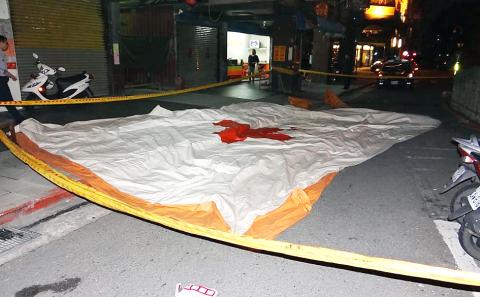A 53-year-old woman in Taipei jumped to her death on Saturday morning, leaving behind a note accusing President Ma Ying-jeou (馬英九) of incompetence and of showing no concern for the sufferings of people.
Kuan Shu-ying (管淑櫻) climbed to the rooftop of the apartment building where she lived on Xinsheng N Road in Taipei at about 4:45am on Saturday. Police and firefighters soon arrived on the scene after receiving telephone calls from onlookers concerned to find Kuan sitting on the roof’s parapet.
Despite efforts to try to convince her to come down, Kuan refused, murmured criticisms of the government and jumped from the 11-story building.

Photo: Wu Yueh-hsiu, Taipei Times
Kuan left behind seven notes — six addressed to her family and one for Ma. In the latter, she called Ma an “incompetent president.”
In the note, Kuan said that, as a national leader, Ma frequently “does things that the people cannot understand” and that he is not fit to be president.
Kuan also accused the judiciary of being untrustworthy. Citing the recent scare over tainted oil, she said the way that the government handled it only made people feel more insecure.
“What’s the point of living in these circumstances?” Kuan wrote.
She went on to question whether Ma “would sleep well at night” as people suffer, and that a taxi driver who committed suicide to protest against government policies would not be the last person to do so.
Kuan was referring to the 58-year-old taxi driver who jumped from a bridge in Yangmingshan National Park last month, leaving a note criticizing the political infighting between Ma and Legislative Yuan Speaker Wan Jin-pyng (王金平).
“Tonight, I am going to give another life to you, which is mine,” Kuan declared at the end of the note.
Although firefighters had prepared an air cushion on the ground, they did not have time to inflate it sufficiently before Kuan jumped to her death.
Kuan’s friends and relatives told the media that she was disillusioned by Ma and the Chinese Nationalist Party (KMT), and often criticized the president and the party.
However, they did not expect Kuan to take such extreme action and were shocked by her death.

INVESTIGATION: The case is the latest instance of a DPP figure being implicated in an espionage network accused of allegedly leaking information to Chinese intelligence Democratic Progressive Party (DPP) member Ho Jen-chieh (何仁傑) was detained and held incommunicado yesterday on suspicion of spying for China during his tenure as assistant to then-minister of foreign affairs Joseph Wu (吳釗燮). The Taipei District Prosecutors’ Office said Ho was implicated during its investigation into alleged spying activities by former Presidential Office consultant Wu Shang-yu (吳尚雨). Prosecutors said there is reason to believe Ho breached the National Security Act (國家安全法) by leaking classified Ministry of Foreign Affairs information to Chinese intelligence. Following interrogation, prosecutors petitioned the Taipei District Court to detain Ho, citing concerns over potential collusion or tampering of evidence. The

‘FORM OF PROTEST’: The German Institute Taipei said it was ‘shocked’ to see Nazi symbolism used in connection with political aims as it condemned the incident Sung Chien-liang (宋建樑), who led efforts to recall Democratic Progressive Party (DPP) Legislator Lee Kun-cheng (李坤城), was released on bail of NT$80,000 yesterday amid an outcry over a Nazi armband he wore to questioning the night before. Sung arrived at the New Taipei City District Prosecutors’ Office for questioning in a recall petition forgery case on Tuesday night wearing a red armband bearing a swastika, carrying a copy of Adolf Hitler’s Mein Kampf and giving a Nazi salute. Sung left the building at 1:15am without the armband and apparently covering the book with a coat. This is a serious international scandal and Chinese

Seventy percent of middle and elementary schools now conduct English classes entirely in English, the Ministry of Education said, as it encourages schools nationwide to adopt this practice Minister of Education (MOE) Cheng Ying-yao (鄭英耀) is scheduled to present a report on the government’s bilingual education policy to the Legislative Yuan’s Education and Culture Committee today. The report would outline strategies aimed at expanding access to education, reducing regional disparities and improving talent cultivation. Implementation of bilingual education policies has varied across local governments, occasionally drawing public criticism. For example, some schools have required teachers of non-English subjects to pass English proficiency

TRADE: The premier pledged safeguards on ‘Made in Taiwan’ labeling, anti-dumping measures and stricter export controls to strengthen its position in trade talks Products labeled “made in Taiwan” must be genuinely made in Taiwan, Premier Cho Jung-tai (卓榮泰) said yesterday, vowing to enforce strict safeguards against “origin laundering” and initiate anti-dumping investigations to prevent China dumping its products in Taiwan. Cho made the remarks in a discussion session with representatives from industries in Kaohsiung. In response to the US government’s recent announcement of “reciprocal” tariffs on its trading partners, President William Lai (賴清德) and Cho last week began a series of consultations with industry leaders nationwide to gather feedback and address concerns. Taiwanese and US officials held a videoconference on Friday evening to discuss the